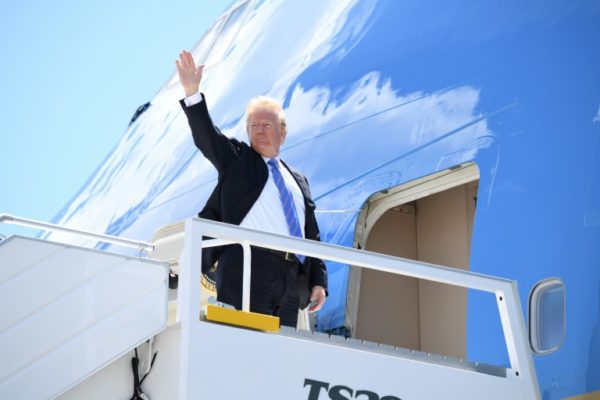The leaders of the G7 failed to heal a tariff dispute that has pushed them to the brink of trade war Saturday, as Donald Trump quit their summit early and warned Canada, Japan and Europe that “the gig is up.”
Trump claimed America was obliged to levy tariffs as it has been exploited as the world’s “piggy bank” under existing arrangements, but his counterparts were equally determined to protect “rules-based” international trade.
The joint communique that was thrashed out painfully over two days of tense negotiations vowed that members would reform multilateral oversight of commerce through the World Trade Organization (WTO) and seek to cut tariffs.
“We commit to modernize the WTO to make it more fair as soon as possible. We strive to reduce tariff barriers, non-tariff barriers and subsidies,” the members said, reflecting the typical language of decades of G7 statements.
But even this was overshadowed by Canadian host Prime Minister Justin Trudeau vowing to impose retaliatory tariffs on US goods after Trump’s “insulting” decision to invoke national security to justify a levy on aluminum and steel.
“Canadians are polite and reasonable but we will also not be pushed around,” he said.
The US president left the summit first, bound for Singapore and a historic summit with North Korea’s Kim Jong Un, after warning the other G7 leaders that trade between their countries must be better balanced or halt altogether.
“I guess they’re going to go back to the drawing board and check it out, right?” he said, warning that if his allies make good on threats to take retaliatory measures they could find themselves shut out of American markets.
“The European Union is brutal to the United States … They know it,” he insisted in his departing news conference. “When I’m telling them, they’re smiling at me. You know, it’s like the gig is up.”
European officials said Trump had tried to water down the language in the draft final summit communique on the World Trade Organisation and rules-based trade.
In the end, that language stayed in and only on climate change did the G7 break into the G6+1.
The US team would not countenance signing off on a pledge to implement the Paris Climate accord, which Trump’s Washington wants no part of.
European leaders put a brave face on the results.
“For us, it was important to have a commitment to rules-based trade,” Germany’s Chancellor Angela Merkel said.
French President Emmanuel Macron, whose country will assume the G7 presidency after Canada and host next year’s summit in Biarritz, said work would continue.
“This G7 does not put an end to all our disagreements, but in a context of tension it did allow us to preserve unity wherever that was possible,” he said, hailing in particular the way European leaders had made common cause.
“The fact that we weren’t ready to downgrade our positions allowed us to have a better result than we might have hoped for.”
– Trade war fears –
At the summit, Trump played a wild card, suggesting that rather than both sides boosting retaliatory tariffs — as he has just done on steel and aluminium — they could declare for entirely free trade in the G7 zone.
“No tariffs, no barriers. That’s the way it should be. And no subsidies. I even said, ‘no tariffs!’” Trump insisted. “That would be the ultimate thing, whether or not that works, but I did suggest it.”
Trump’s utopian idea was greeted with skepticism, but he appeared to take it seriously, arguing that the United States had been taken for a ride by the rest of the world.
European officials suggested that the upbeat, punchy news conference that Trump delivered before skipping out was aimed at his trade-skeptic supporters back home and did not reflect the results of the summit.
“We’re talking to all countries,” Trump said, denouncing what he said were huge existing tariffs on US exports around the world. “It’s going to stop. Or we’ll stop trading with them. And that’s a very profitable answer, if we have to do it.
“If they retaliate, they’re making a mistake,” he warned, insisting that the United States has much less to lose than its partners in the event of world trade breaking down. “We will win that war 1,000 times.”
The summit was wrapping up just as Chinese President Xi Jinping began hosting the leaders of Russia and Iran at a two-day regional security meeting in a symbol of the power-play between East and West. (NAN)





